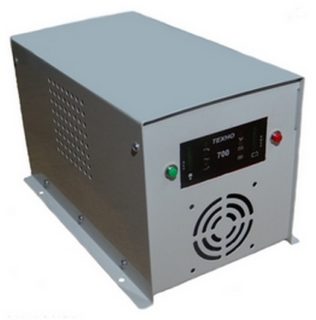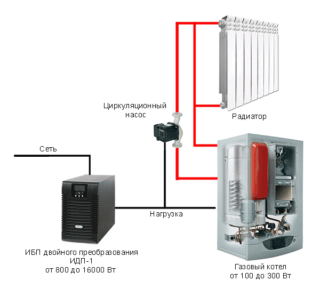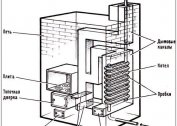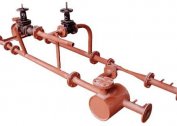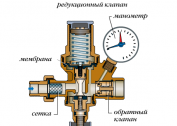Modern heating systems, including gas-fired, according to the instructions for use, operate continuously and need protection from accidents on power lines. The dependence on power supply is even more relevant for power units equipped with instrumentation and a pump. Frequent interruptions in the supply of electricity violate the normal mode of operation of the device, sometimes they cause its breakdown. Since the power failure usually occurs for a short time (from 5 minutes to a day), a typical uninterruptible boiler is used to protect the power line - UPS.
When do I need a UPS for the boiler
The issue under consideration is of particular importance in rural areas, where unstable energy supply has recently become almost the norm. In summer in hot weather, it does not bother the owners too much, but in the winter season during the heating season cardinal measures will be required to protect the equipment and maintain its operability.
To a large extent, the problem with food instability concerns country houses and cottages, where the purchase of an uninterrupted heater for a heating boiler is the only right solution.
An uninterruptible power supply unit for a heating boiler is in demand in the following typical situations:
- heating equipment is used in areas with unstable power supply;
- operation of the heating system is caused by the need to maintain a comfortable air temperature in the winter season;
- In urban substations, constant outages are observed due to the uneven distribution of loads across the serviced facilities.
The purchase of a UPS for a gas boiler will solve the issue of unstable power.
Principle of operation
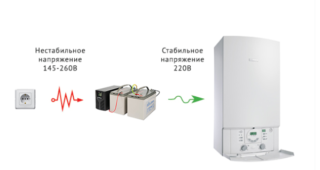 The essence of the operation of the device in relation to boiler equipment does not differ significantly from the principle of protection of other electrical devices. It is expressed in the adoption of special measures to stabilize the voltage and the ability to maintain it for a while at the required level. For these purposes, a UPS is used for boilers with an external battery connected, the constant voltage from which is converted to alternating by an electronic inverter.
The essence of the operation of the device in relation to boiler equipment does not differ significantly from the principle of protection of other electrical devices. It is expressed in the adoption of special measures to stabilize the voltage and the ability to maintain it for a while at the required level. For these purposes, a UPS is used for boilers with an external battery connected, the constant voltage from which is converted to alternating by an electronic inverter.
To smooth voltage fluctuations in the network or to protect against its short-term failure, the double conversion principle is used, which consists in the following:
- The corrected alternating voltage is supplied to the line filter, which smooths out sharp fluctuations due to the limitation of the RF harmonics.
- It enters the diode bridge, which converts the variable component into a constant.
- If necessary, part of the rectified current is spent on the charging circuit of the standby battery, used in a situation where the voltage disappears for a long time.
- Its main part goes to the inverter, in which the inverse transformation of the constant component into a variable is carried out.
- The stabilized voltage thus obtained is suitable for supplying a solid fuel or gas boiler.
The advantage of a double conversion UPS circuit is the lack of a bulky autotransformer. The device operating according to this principle guarantees continuous, instantaneous voltage correction. If necessary, it can work due to the energy stored in the batteries.
Uninterruptible Requirements
To find out which uninterrupted unit is suitable for a gas boiler, you first need to determine the requirements that apply to the device.Familiarity with the main indicators of the UPS characterizing the efficiency of its work will help. Some of them:
- Active and full (taking into account the reactive component) power, defined as the product of the supply voltage by the current strength in the load.
- Harmonic distortion coefficient, indicating the quality of the output voltage - the deviation of the shape of the sine wave from the ideal form.
- The presence of an external battery, which allows not to interrupt the operation of the boiler in the complete absence of mains power for several hours.
- Duration of offline operation.
- The limits of permissible fluctuations in the input voltage in Volts.
The duration of the battery depends to a large extent on its capacity.
When, according to the operating conditions of boiler equipment, long interruptions in power supply are expected, the possibility of connecting additional batteries should be provided. It is also desirable that the purchased device has the function of automatically monitoring the status of the mains and restoring normal power mode.
Particularly "advanced" models are encouraged to have the option of diagnosing the state of the battery. However, such samples rarely top the popularity ratings of protective uninterruptible power supply units, since they are too expensive.
Which UPS to choose for a gas boiler
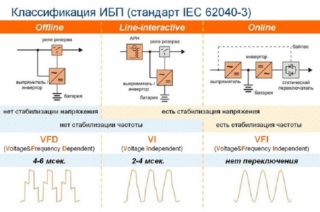 When choosing a UPS for the boiler, it will be necessary to take into account a number of factors related to the features of its application at a particular facility. Based on the following considerations:
When choosing a UPS for the boiler, it will be necessary to take into account a number of factors related to the features of its application at a particular facility. Based on the following considerations:
- device functionality (double conversion, battery, etc.), as well as ease of installation;
- reliability of the manufacturer of the electronic conversion device;
- guarantees for the period of trouble-free operation of uninterruptible power supplies for gas boilers - the indicator should not be less than 5-7 years;
- noise level during operation;
- the presence of a selected model of a quality certificate.
Given these points, the user can go to the store and choose a model of an inverter converter that is suitable specifically for his boiler.
Calculation of backup power time
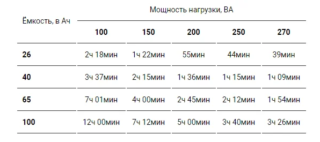 The battery life of the UPS with external batteries is determined solely by the total capacity of all batteries connected to the system. In this case, the energy of their charge is converted into an alternating voltage of 220 volts. Since the inverter itself (like all electronic devices) has internal losses, it is necessary to take them into account in the form of an efficiency that is different from 100%. When determining the required indicator, it is taken into account that the batteries are also not ideal and do not “give out” all the energy stored in them during operation. In this case, you will need to take into account the battery availability factor included in the uninterruptible battery kit.
The battery life of the UPS with external batteries is determined solely by the total capacity of all batteries connected to the system. In this case, the energy of their charge is converted into an alternating voltage of 220 volts. Since the inverter itself (like all electronic devices) has internal losses, it is necessary to take them into account in the form of an efficiency that is different from 100%. When determining the required indicator, it is taken into account that the batteries are also not ideal and do not “give out” all the energy stored in them during operation. In this case, you will need to take into account the battery availability factor included in the uninterruptible battery kit.
Given these two indicators, the formula for calculating the desired time period takes the following form:
T = E x U / P x KPD x KDE (in hours) where
- E - total capacity of connected batteries,
- U - current battery voltage,
- P - active power in the load.
The coefficient for the KPD inverter is close to 0.8, and the same indicator for the battery (KDE) is approximately 0.9. They are not fixed values and depend on a number of operational factors: the amount of energy consumption, as well as the temperature and humidity of the air.
As an example, several options are presented for calculating the battery life of an uninterruptible battery “Calm”. With an initial voltage of 12 volts and a total capacity of 60 ampere-hours, the UPSs are used for a wall-mounted heating boiler with a declared power of 150 watts. In this situation, the time of its independent work is obtained: T = 60 x 12/150 x 0.8 x 0.9 = 3.5 hours.
When considering an option with a battery capacity of 150 ampere-hours, this indicator for a boiler with the same energy costs will be: T = 150 x 12/150 x 0.8 x 0.9 = 8.6 hours.
If there are two batteries with the same capacity, the time of its operation in the absence of voltage in the network will be equal to: T = 2 x 150 x 12/150 x 0.8 x 0.9 = 17.2 hours.
The above calculation method is suitable for any series of UPSs, including the common models Baxi, Bosch, Vaillant and Buderus.
With an increase in the number of rechargeable batteries, the sought time period increases. Its extension is facilitated by the selection of the optimal mode of operation of the boiler from independent power sources.
Installation Features
Everyone who plans to install a UPS for a gas boiler with their own hands first will need to familiarize themselves with the rules for its installation and connection. When choosing a location for installing this unit, it is necessary to consider that it is recommended to place the UPS and battery for a gas boiler in areas of the office room that are well protected from wet fumes. For these purposes, an airtight cabinet, located as close as possible to the ventilation shaft, is optimal. This position will protect the backup equipment from excess moisture in the form of condensate and will maintain the required cooling mode.
In addition to choosing a place, the desired microclimate in the room is ensured by maintaining the air temperature within 18-25 degrees. In this case, the battery capacity is maintained at the maximum level, due to which the UPS operates for a long time.
To all these features, you must add the following:
- The dust level of the room with the UPS and boiler located in it should be minimal.
- The source casing is subject to mandatory grounding using a full-fledged memory (protective circuit). In its absence, it is allowed to organize grounding through the same bus to which the heating unit itself is connected. To do this, you will have to stretch a separate copper core from the UPS grounding terminal to the corresponding boiler contact.
- in the boiler room, a forced ventilation system is required that provides effective air purification from gas emissions (they are formed during the electrolysis reaction in the battery).
Before installing the equipment you just bought, just before installing it, you should make a short pause so that the case temperature is equal to the room indicator. Such exposure will avoid condensation on the internal surfaces of the UPS and moisture in the work units. When placing external batteries and the source itself directly on the floor, it is advisable to use a special substrate in the form of a rubber mat. When connecting additional consumers to the stabilization module, it is necessary to calculate their total power in such a way that the obtained indicator does not go beyond permissible limits. As a rule, it is selected from the calculation so as not to exceed 50-60% of the rated power.
When installing and operating a set of equipment is strictly prohibited:
- connect the source in parallel with the line of power supply: the effect of the UPS is possible when it is connected between the network and the consumer;
- to close the device case with foreign things and objects restricting the access of fresh air;
- periodically overload the device in excess of the permissible power limit indicated in the accompanying documentation (passport).
Care must be taken to monitor the polarity of the battery to the UPS. Violation of this rule may result in equipment damage.
To extend the life of the backup power system, it is not allowed to combine a larger number of batteries with a cable than is specified in the technical documentation.
